Turmoil for firms over shortage of labour and goods
- Published
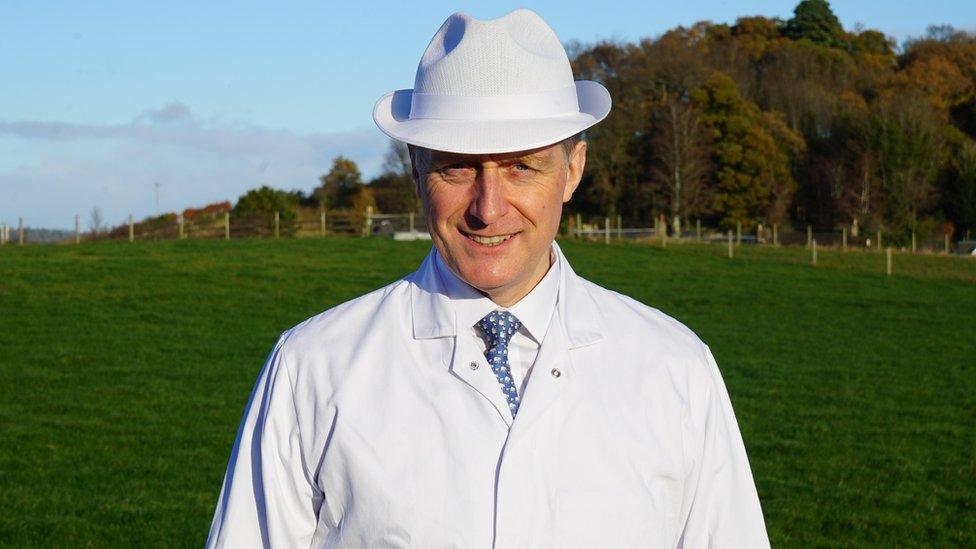
Simon Howie says he is finding it almost impossible to attract workers to a "dirty-hands job" in rural Scotland
Simon Howie has built his butcher's business into a Scottish success story over four decades but now there is a problem.
He started in 1986, at the age of 19, opening a small farm shop at the foot of the Ochil Hills before building a firm with a £19m turnover, supplying supermarkets with sausages and a range of other products.
But expansion has stalled and Mr Howie blames the UK's "racist" immigration rules after leaving the European Union.
The company has enough orders to employ 140-150 staff at its factory in Dunning, Perthshire, he explains, but job applications have plummeted since Brexit and the headcount is stuck, stubbornly, at 110.
Mr Howie says some 60% of his staff are immigrants and even after raising wages by 20% he is finding it almost impossible to attract workers - local or foreign - to what he calls a "dirty-hands job" in rural Scotland.
After leaving the EU's single market with its free movement of people, goods, services and capital, he says: "We are fishing in a smaller pool."
According to the trade body Scotland Food and Drink, the sector employs some 60,000 people but is short of 10,000 - 11,000 staff at present.
It's not just manufacturing. Hospitality is feeling the squeeze too.
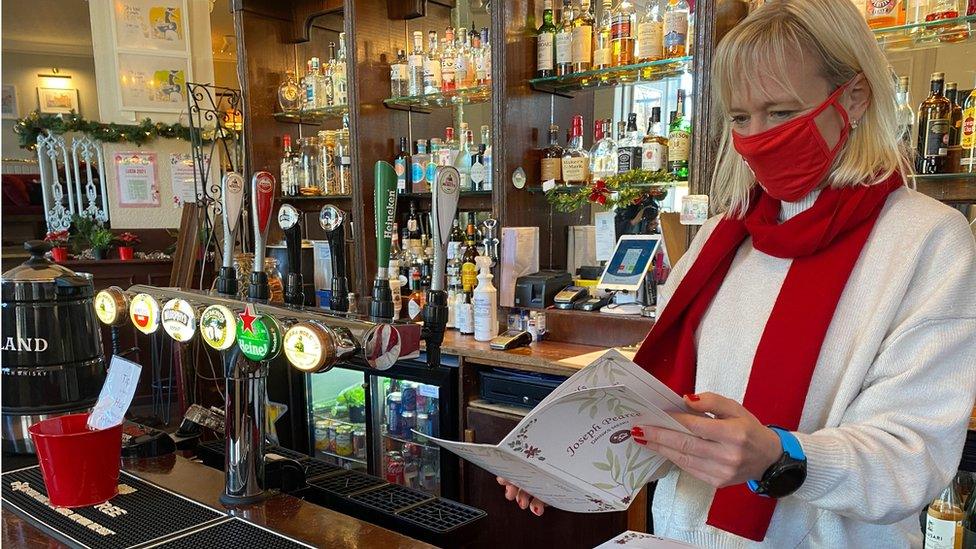
Anna Christopherson is still struggling to source enough staff and supplies to keep her bars going
Before the pandemic, Anna Christopherson employed 120 people in seven bars and restaurants in Edinburgh but lockdowns and other Covid constraints left her chain, Boda Bars, struggling to pay rent and bills.
Now just two venues and 21 workers remain and she is still struggling to source enough staff and supplies to keep them going.
"It's been horrendous," says Ms Christopherson, who is also dealing with a wave of Christmas cancellations because of the latest Covid restrictions.
Serving those who do turn up has often been tricky because of sporadic shortages.
Ms Christopherson reels off a long and varied list of affected products: draught beer, carbon dioxide, tequila, wine, glass bottles, corks, even eggs and milk have all been hit, she says.
The reasons are complex and global and appear to include clogged up ports, rising costs of shipping, driver shortages and new bureaucracy relating to EU imports.
"Brexit has been massive," says Ms Christopherson. "We're going to see that for the rest of our lives, I think."
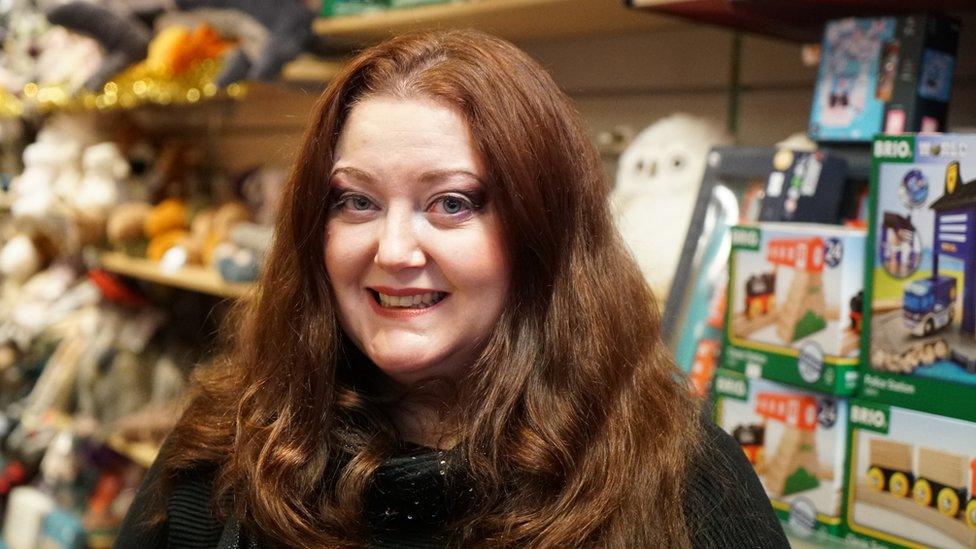
Toy shop owner Alexis Alexander has faced delay, disruption and disappointment
The Big Top toy shop in Glasgow is also struggling with stock.
Owner Alexis Alexander says some of her suppliers insisted on orders for Christmas being placed much earlier than usual.
Even so she has faced delay, disruption and disappointment.
The shelves in her brightly coloured store are not exactly bare but in mid-December they should be groaning with traditional teddies, a festive favourite.
Instead only 50 bears have arrived from an order of 200 which she placed in June.
"You run the risk of running out of things entirely and you can't sell air on the shelves," says Ms Alexander who sources 70% of her products from continental Europe.
She thinks leaving the trading bloc has resulted in less flexibility and higher customs costs but she also suspects Brexit and the pandemic are being used as "cover-all" excuses by inefficient firms which should have adapted to both challenges by now.
'Significant frictions'
Josie Dent, managing economist at the Centre for Economics and Business Research, thinks it is unfair to blame the current turmoil on Brexit.
"We've seen significant frictions with the world reopening and demand increasing and supply not being able to match," she says.
"A lot of countries are experiencing these kinds of issues completely unrelated to Brexit," she adds.
In the end, many Brexit supporters insist, we will end up with more employment opportunities for British workers as a result of leaving the EU.
A month before the EU referendum in 2016 Boris Johnson said voting leave would mean a jobs bonanza — a "huge world of opportunity and prosperity" in his words.
"After we liberate ourselves from the shackles of Brussels we will be able to create hundreds of thousands of new jobs right across the UK, external," he said.
If Boda Bars' experience is anything to go by, we do not appear to be there yet. The group is finding recruitment incredibly difficult even after putting up wages.
"We've been looking for a chef here since June," says Anna Christopherson.
Perhaps for those who do remain in the country - and for local workers - the pandemic has made serving salad and spritzers less attractive.

That's certainly the case for Shayna Alnwick, from the US state of Georgia. Before the virus shook up everything she was working as a waitress in a British steakhouse.
"Obviously we cannot serve steak through Zoom calls," she says.
Instead she is sanding a chest of drawers in a small spare room in the west end of Glasgow having switched careers to become a social media star whose DIY videos have won her hundreds of thousands of followers.
Covid, she says, meant lower tips, masks all day, and grumpy customers.
"Everybody was always on edge," says Ms Alnwick.
Her story illustrates the extent to which the most dramatic disruption to our lives since World War Two has upended the economy.
According to the Fraser of Allander Institute's Scottish Business Monitor survey, external, 60% of firms had vacancies in the third quarter of this year, and 86% of those said they were finding it difficult or very difficult to fill the posts.
More than two-thirds of companies said wages were higher in July - September than they had been in the previous three months.
The optimistic view is that we are in a process of creative destruction which will eventually settle down, with surviving companies slimmer and more efficient; innovative new firms born from the ashes; and a happier and more productive workforce.
"We're still optimistic for the underlying economic situation," says Ms Dent.
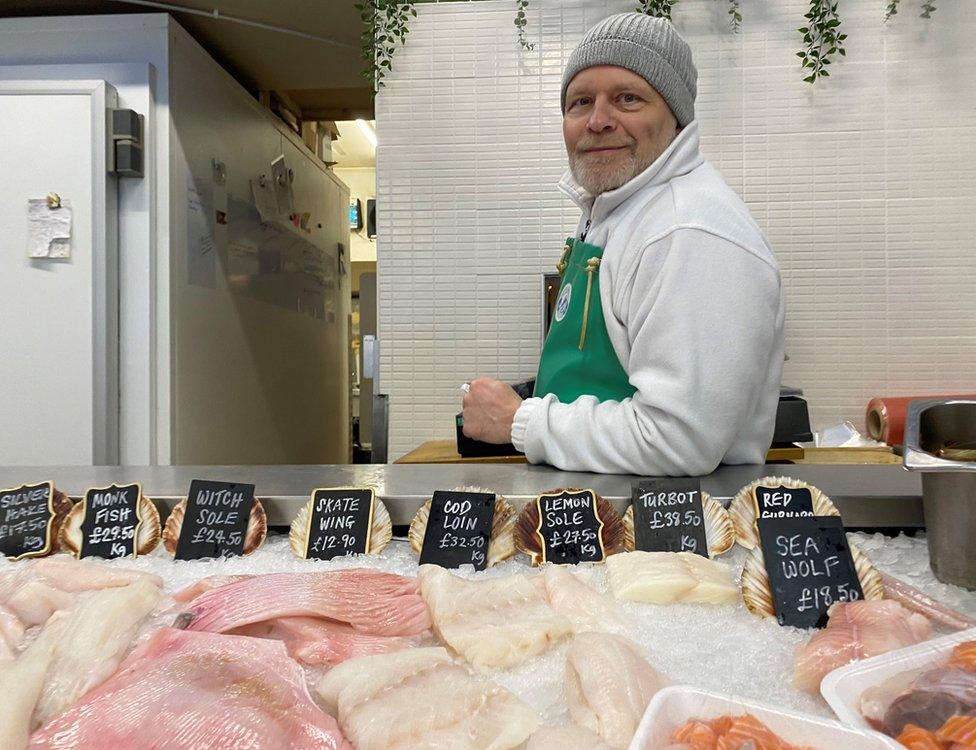
Campbell Mickel has shut two of his three businesses in Edinburgh
Campbell Mickel is not convinced. He has shut two of his three businesses in Edinburgh - a fishmonger's and a restaurant - and doesn't see any immediate respite.
Waiting for a delivery of octopus and squid outside his remaining fish shop in Marchmont, he insists Brexit is to blame for cutting the pool of young foreign students willing to work in the UK.
"We need the Spaniards and the French and the Portuguese," he says, insisting that the students he used to employ worked hard, contributed to society and paid their taxes.
"They didn't come over here to sit on their butts," he says.
"I don't care how much 'Dunkirk spirit' we put behind this," he says, scathingly. "This is a catastrophic failure. They have to open the borders."
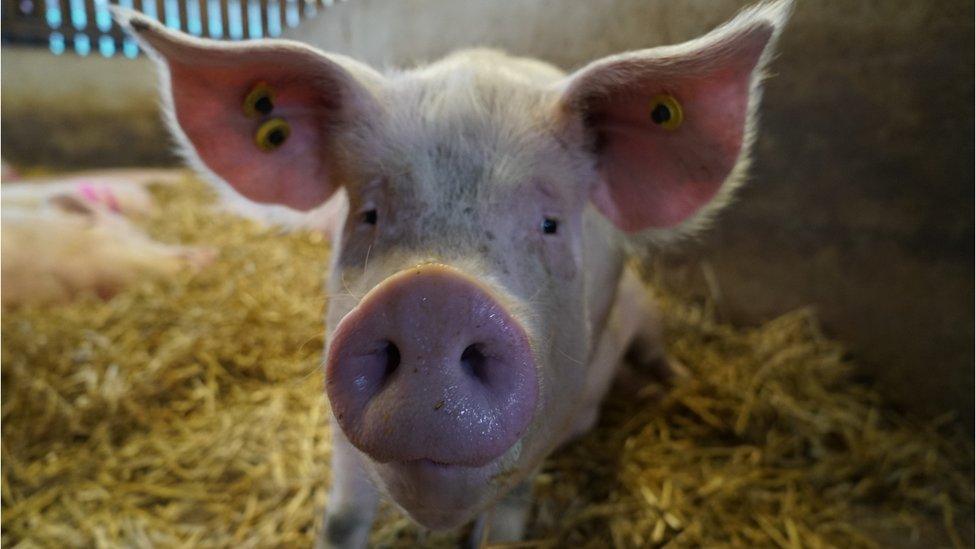
Agriculture is also facing a labour shortage and inflationary pressures, according to Robin Traquair, vice-president of the National Farmers Union of Scotland, who owns a pig farm near Dalkeith, Midlothian.
The animals eat wheat and barley which have risen in price plus there is a shortage of abattoir staff, which means pigs staying in their pens for longer.
"Not only are pigs being held back," says Mr Traquair, but while they are on the farm "they're eating more expensive food".
The UK government insists it is trying to help. A spokesperson told the BBC it was "maximising the benefits of Brexit through our points-based immigration system," with "butchers, processors and dressers...all eligible for the Skilled Worker visa route under the new system."
Ministers were "helping people across the country retrain, build new skills and get back into work," the spokesperson added.
Mr Traquair accepts that the solution to some of the shortages may lie in Scotland but he reckons that will come at a cost.
"Longer term, we're going have to train people up, local people," he says, adding "the consequence is that there will be food price inflation."